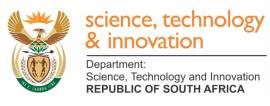
PRETORIA, Nov 8 (NNN-SANEWS) — South Africa’s Department of Science, Technology and Innovation (DSTI), in partnership with the Food and Agriculture Organisation of the United Nations (FAO), is developing a Science, Technology and Innovation (STI) Roadmap for Agriculture.
According to the department, this strategic initiative will enhance institutional coordination, drive innovation and support the transformation of South Africa’s agrifood system into one that is inclusive, resilient and aligned with national and regional development priorities.
Agriculture remains South Africa’s most resilient sector but still faces persistent structural challenges that contribute to low productivity and slow gross domestic product (GDP) growth.
These include high input costs, market competition, unreliable energy supply, climate change impacts such as droughts and shifting weather patterns, widespread rural poverty, food insecurity, underutilisation of arable land and household food insecurity.
“The roadmap will promote the development of new high-value crops, livestock and agro-processed products; create expanded opportunities for women and youth in rural areas. It will focus on enhancing food and nutrition security through sustainable technologies and strengthen value chains that support livelihoods and socio-economic transformation.”
Anchored in South Africa’s STI Decadal Plan 2022-2032 and the 2019 STI White Paper, the statement said the roadmap aims to modernise productive sectors and promote inclusive growth through innovation, creativity and strategic partnerships.
In alignment with the FAO’s Strategic Framework for 2022-2031, this initiative promotes the “Four Betters“– better production, better nutrition, a better environment, and better living conditions.
It also directly contributes to the achievement of Sustainable Development Goals (SDGs) 2 (zero Hunger), 9 (industry, innovation, and infrastructure), and 13 (climate action).
The Decadal Plan emphasises key intervention areas for the challenges facing agriculture.
These include, but are not limited to, plant and animal improvement, digital decision-support systems, precision agriculture, biosecurity, early-warning systems, agro-processing, value chain development, skills development and farmer development support.
“A key aim is to build an inclusive and competitive agricultural bioeconomy targeting marginalised groups, women, youth and smallholder farmers.“
The roadmap aligns with various national strategies, including the Agriculture and Agro-processing Master Plan, led by the Department of Agriculture, Land Reform and Rural Development.
It also supports the Forestry Sector Master Plan and the Aquaculture Research and Technology Development Strategy, both championed by the Department of Forestry, Fisheries, and the Environment.
In addition, it incorporates the Agricultural Bio-economy Innovation Partnership Programme from the DSTI, which aims to foster public-private innovation partnerships, create innovation opportunities, promote inclusive growth, and facilitate economic recovery.
The Directors-General of the key departments will appoint a steering committee to guide the STI roadmap, while an advisory committee will be established and constituted by members from industry, academia and implementing agencies for inclusivity.
An inception meeting to introduce the project to key role-players was convened in September 2025.
The South African government places a high priority on STI as a driver for addressing societal challenges such as food and nutrition security, while advancing the SDGs.
“The FAO also recognises STI as central to transforming agrifood systems to become more efficient, inclusive, resilient and sustainable – leaving no one behind.“
The roadmap is expected to be completed by the end of September 2026. — NNN-SANEWS





